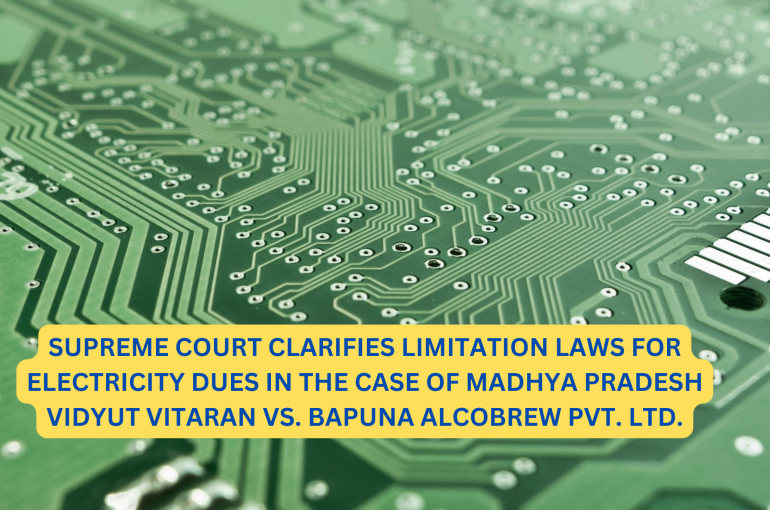SUPREME COURT CLARIFIES LIMITATION LAWS FOR ELECTRICITY DUES IN THE CASE OF MADHYA PRADESH VIDYUT VITARAN VS. BAPUNA ALCOBREW PVT. LTD.
Introduction:
The Hon’ble Supreme Court in the matter of Madhya Pradesh Madhya Kshetra Vidyut Vitaran Company Limited & Ors. vs. Bapuna Alcobrew Private Limited & Anr. [2024 INSC 829] vide Order dated 4.11.2024, held that the limitation period prescribed under Section 56(2) of the Electricity Act, 2003 does not apply retrospectively to liabilities incurred under the earlier Electricity Act, 1910.
The judgment was delivered by a Division Bench headed by Justice Dipankar Datta and Justice Pankaj Mithal. This decision reaffirms the statutory rights of electricity distributors to recover dues beyond the two-year limitation period set forth by the 2003 Act, particularly for liabilities accrued under previous legislation.
Facts of the Case:
The dispute originates between the Madhya Pradesh Madhya Kshetra Vidyut Vitaran Company Limited (hereafter referred to as the “Appellants”) and Bapuna Alcobrew Private Limited (hereafter referred to as the “Respondent”). The Respondent is a company engaged in manufacturing rectified spirit and Indian-made foreign liquor in Madhya Pradesh.
The parties initially signed an agreement on 18.11.1991, where the Appellants agreed to supply electrical energy to the Respondent’s facility in Gwalior. The Respondent guaranteed a minimum annual revenue consumption.
Additional agreements followed, increasing the contracted demand. By 01.06.1996, the Respondent’s contract demand was increased to 1170 kVA.
The Respondent sought permission to install an 807 kVA biogas generator for captive use. The Appellants permitted this on 30.05.1996, with the condition that the generator would not operate parallel to the Appellants’ power supply and would only serve as a standby.
Alleging unauthorized parallel operation of the generator, the Appellants issued a notice on 28.03.2000, cancelling the permission. This led to the Respondent filing a writ petition challenging the cancellation.
Despite interim relief from the High Court, the Appellants issued show cause notices and demands for charges amounting to ₹70,50,000 for not meeting the minimum consumption guarantees. The Respondent challenged these notices through multiple writ petitions.
Issues for Consideration:
- Whether the demand raised by the Appellants for the period between June 1996 and May 2000 was time-barred under Section 56(2) of the Electricity Act, 2003?
- Whether the Respondent was liable to pay for minimum guaranteed consumption charges despite using its own captive power generation?
- Whether the second show cause notice and subsequent demand were valid under the provisions of both the old Electricity Act, 1910, and the new Electricity Act, 2003?
Appellant’s Arguments:
The Appellants contended that Section 56(2) of the Electricity Act, 2003, which prescribes a two-year limitation for recovery of charges, did not apply to dues incurred under the 1910 Act.
The Appellants argued that their right to recover charges was protected under the earlier law and was unaffected by the new Act. They relied on precedents where the Supreme Court had held that statutory liabilities incurred before the new Act are not barred by its limitation period.
Respondent’s Arguments:
The Respondent argued that the demands were raised arbitrarily and beyond the limitation period prescribed under Section 56(2) of the Electricity Act, 2003. They claimed that the Appellants’ delay of over 9 (nine) years in issuing demands was unreasonable and amounted to harassment.
The Respondent further contended that the Appellants had acted unjustly by encashing a bank guarantee without prior notice.
Analysis by the Court:
The Supreme Court disagreed with the High Court’s interpretation that Section 56(2) of the 2003 Act applied retrospectively to liabilities incurred under the earlier 1910 Act. The Court referenced its earlier decisions, clarifying that liabilities under the old law are not subject to the two-year limitation period introduced by the 2003 Act.
The Court noted that the Respondent was estopped from challenging the demands due to their previous failure to Appeal against earlier High Court orders upholding the Appellants’ right to levy minimum guarantee charges. This principle, known as “issue estoppel,” barred the Respondent from re-litigating the same issue.
While acknowledging that there was a significant delay in issuing the demand notices, the Court held that the delay did not nullify the Appellants’ statutory right to recover dues, especially since the Respondent had accepted earlier court orders directing payment of charges.
Judgment:
The Supreme Court set aside the High Court’s decision that had quashed the Appellants’ second show cause notice. The Court upheld the validity of the Appellants’ demand, allowing them to recover charges from the Respondent for the specified period.
The Appeal was allowed, and the Supreme Court ruled in favor of the Appellants, permitting them to retain the revised amount recovered from the Respondent. Both parties were directed to bear their own costs.
ASHITA
ASSOCIATE
THE INDIAN LAWYER & ALLIED SERVICES





































Leave a Reply